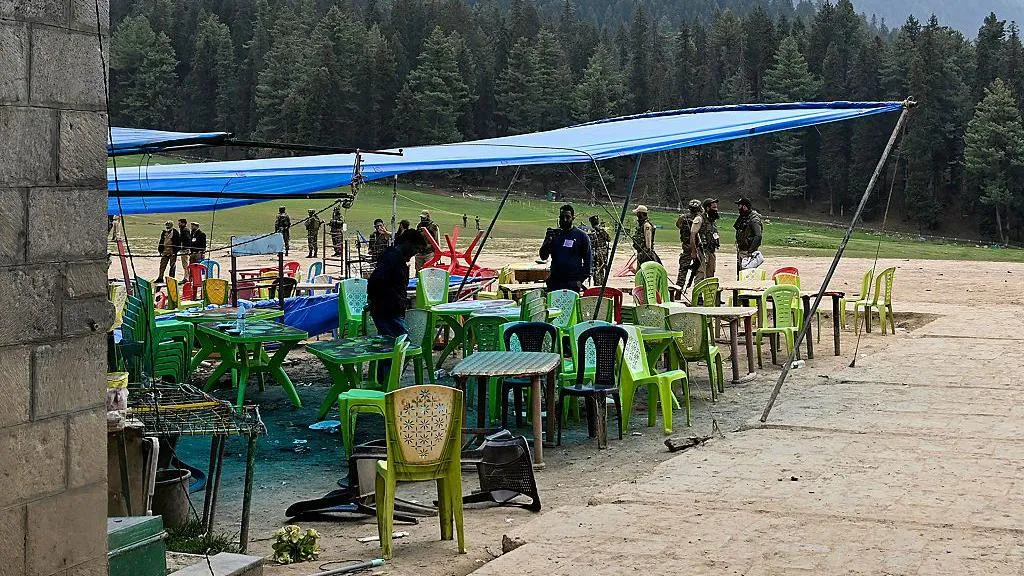Authorities in Indian-administered Kashmir have demolished the homes of at least 10 alleged militants and detained several individuals for questioning as investigations continue into the killings of 26 people last week. Indian security forces have used explosives to destroy properties since the attack on tourists last Tuesday, with at least one property reportedly linked to a suspect involved in the shootings.
India has accused Pakistan of supporting the militants behind the killings, although no specific group has been named. Pakistan has denied the allegations.
This attack marks the deadliest assault on civilians in two decades in the disputed Kashmir region, which both India and Pakistan claim and have fought wars over.
Troops from both India and Pakistan have engaged in intermittent small-arms fire across the border for the past few days, fueling speculation about whether India will respond with military strikes, as it did following deadly militant attacks in 2019 and 2016.
Indian authorities reported that over 1,500 people have been detained for questioning since the attack near the tourist town of Pahalgam, and more detentions have occurred since then, though the exact number remains unclear. Extensive searches have been conducted in Indian-administered Kashmir.
While officials have not publicly commented on the demolitions, it is believed that the homes targeted belonged to families of alleged militants or those who have crossed over to Pakistan. The demolitions, which began last Thursday, continued with the most recent one occurring overnight from Saturday to Sunday.
Kashmir’s top leaders have expressed support for action against militants but have raised concerns about demolishing the homes of suspected militants’ families. Jammu and Kashmir Chief Minister Omar Abdullah emphasized that while the guilty must be punished, innocent civilians should not suffer. Former Chief Minister Mehbooba Mufti also criticized the demolitions, urging the government to distinguish between terrorists and civilians.
India’s Supreme Court had banned the practice of ‘bulldozer justice’ last November, a controversial trend of demolishing properties linked to suspected criminals, which has gained momentum in recent years.
In the aftermath of the Pahalgam attack, several Kashmiri students studying across India have reported being attacked or threatened by locals, with some being pressured to leave their colleges.

Kashmir, a region claimed in full by both India and Pakistan but administered in part by each, has been a major flashpoint between the two nuclear-armed countries since their partition in 1947. Indian-administered Kashmir has been the site of an ongoing armed insurgency against Indian rule since 1989, with militants targeting both security forces and civilians.
India has yet to name any specific group responsible for the attack in Pahalgam, and the identity of the perpetrators remains unclear. A little-known group called the Resistance Front, initially reported to have claimed responsibility, later issued a statement denying involvement. The Resistance Front is believed to be affiliated with Lashkar-e-Taiba, a Pakistan-based militant group.
Indian police have identified three of the four suspected attackers: two Pakistani nationals and one local man from Indian-administered Kashmir. The identity of the fourth attacker remains unknown. Many survivors of the attack reported that the gunmen specifically targeted Hindu men.
The deadly assault has sparked widespread anger across India, with Prime Minister Narendra Modi vowing to hunt the suspects “till the ends of the earth” and promising that those responsible will face severe punishment.
Tensions between India and Pakistan surged immediately following the killings, resulting in tit-for-tat actions. India suspended the 1960 Indus Waters Treaty, a World Bank-brokered agreement between the two countries over water sharing, which prompted Pakistan to protest, calling the stoppage or diversion of water an “act of war.” In retaliation, Pakistan suspended the 1972 Simla Agreement, which both nations had signed to resolve disputes through peaceful bilateral negotiations.
Both countries also expelled many of each other’s diplomats and revoked civilian visas, which had already been difficult to obtain, leaving many individuals stranded on both sides of the border. At least 500 Pakistani nationals, including diplomats and officials, have left India via the Attari-Wagah land border since the attack.
As tensions continue to rise, India has alleged multiple instances of cross-border firing by Pakistan along the Line of Control, though Pakistan has yet to confirm these reports.
In his monthly radio address, Modi reiterated his commitment to securing justice for the victims’ families, suggesting the attack was meant to disrupt the region’s return to normalcy after years of violence. “The enemies of the country, of Jammu and Kashmir, did not like this,” he said.
Meanwhile, a US State Department spokesperson confirmed that Washington is in contact with both India and Pakistan, urging them to work toward a responsible resolution. British Foreign Secretary David Lammy also engaged with his counterparts in both countries.

